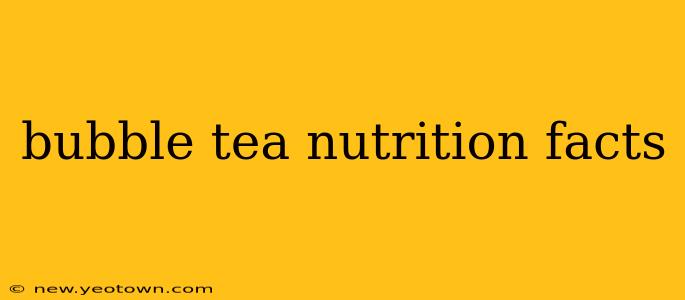Bubble tea, also known as boba tea, pearl milk tea, or simply boba, has taken the world by storm. Its delightful combination of chewy tapioca pearls, flavorful tea, and creamy milk (or other bases) makes it an irresistible treat. But behind the sweet allure lies a question many are curious about: what exactly are the nutrition facts of this beloved beverage? Let's unravel the complexities and explore the nutritional landscape of bubble tea.
This isn't just about calories; we'll delve into the sugar content, fat composition, and potential health impacts. We'll even address variations to help you make informed choices when indulging in your next boba fix.
What are the Calories in Bubble Tea?
The calorie count in bubble tea can vary wildly depending on several factors: the type of tea used (green, black, oolong), the added milk (dairy, non-dairy), the type and amount of sweetener (sugar, honey, artificial sweeteners), and the size of the drink. A small, less-sweetened green tea with a small amount of milk might clock in around 150-200 calories, while a large, sugary, creamy version could easily exceed 500 calories. Think of it like this: you're essentially drinking a milkshake with tea, and that milkshake can be customized to be quite calorically dense.
How Much Sugar is in Bubble Tea?
This is often the biggest concern for many. The sugar content can be shockingly high, easily surpassing the recommended daily intake in just one large serving. Many bubble tea shops use high-fructose corn syrup or other sugary syrups, contributing significantly to the overall sugar load. The tapioca pearls themselves aren't inherently high in sugar, but the preparation process often involves added sweeteners. Opting for less sugar or sugar-free alternatives is crucial for managing your sugar intake.
What are the Fats in Bubble Tea?
The fat content primarily depends on the type of milk used. Dairy milk adds significant fat, while plant-based milks like soy or almond milk have lower fat content. However, even with low-fat milk options, added flavorings and syrups can influence the overall fat profile. Remember to check the ingredients list if you have specific dietary concerns.
Is Bubble Tea Healthy?
This is a complex question with no simple yes or no answer. In moderation and with mindful choices, bubble tea can be part of a balanced diet. Choosing unsweetened or less-sweetened tea, opting for lower-fat milk options, and selecting smaller sizes significantly reduces the calorie, sugar, and fat content. However, frequent consumption of highly sweetened bubble tea can contribute to weight gain, increased blood sugar levels, and other health problems.
Can I make healthier Bubble Tea at home?
Absolutely! Making your own bubble tea at home allows for complete control over the ingredients. You can use healthier sweeteners like stevia or monk fruit, choose unsweetened tea, and select your preferred milk type. This gives you a delicious and guilt-free treat.
What are the ingredients in Bubble Tea?
The core ingredients typically include tea (black, green, oolong, etc.), milk (dairy or non-dairy), tapioca pearls (boba), and a sweetener. However, many variations exist, with added flavors like fruit purees, chocolate, and various other syrups.
How many carbs are in Bubble Tea?
Carbohydrate content is directly tied to the sugar content and the type of milk used. The tapioca pearls are a major source of carbohydrates, adding to the overall carb count. Therefore, less sugar and smaller portion sizes are your best bet to reduce the carb intake.
Ultimately, bubble tea is a delicious treat, but it's essential to be aware of its nutritional profile. By making informed choices, you can enjoy this popular beverage while minimizing potential negative impacts on your health. Remember moderation is key, and mindful customization can significantly improve the nutritional value of your bubble tea experience.

